
Mount Jackson is a town in Shenandoah County, Virginia, United States. The population was 1,994 at the 2010 census.

Hollywood Cemetery is a historic rural cemetery located at 412 South Cherry Street in the Oregon Hill neighborhood of Richmond, Virginia. It was established in 1847 and designed by the landscape architect John Notman. It is 135-acres in size and overlooks the James River. It is the only cemetery other than Arlington National Cemetery that contains the burials of two United States Presidents, James Monroe and John Tyler.
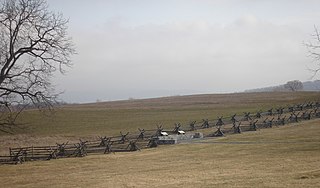
Antietam National Battlefield is a National Park Service-protected area along Antietam Creek in Sharpsburg, Washington County, northwestern Maryland. It commemorates the American Civil War Battle of Antietam that occurred on September 17, 1862.

Cold Harbor National Cemetery is a United States National Cemetery in Mechanicsville, Hanover County, Virginia. It encompasses 1.4 acres (5,700 m2), and as of the end of 2005, had 2,110 interments. Administered by the United States Department of Veterans Affairs, it is managed by the Hampton National Cemetery.
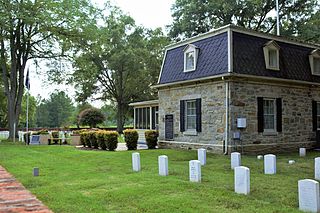
Fort Harrison National Cemetery is a United States National Cemetery located seven miles (11 km) south of the city of Richmond, in Henrico County, Virginia. Administered by the United States Department of Veterans Affairs, It encompasses 1.5 acres (0.61 ha), and as of the end of 2005, had 1,570 interments.

Winchester National Cemetery is a United States National Cemetery located in the city of Winchester in Frederick County, Virginia. Administered by the United States Department of Veterans Affairs, it encompasses 4.9 acres (2.0 ha), and as of the end of 2005, it had 5,561 interments. It is closed to new interments.

Danville National Cemetery is a United States National Cemetery located in the city of Danville, Virginia. Administered by the United States Department of Veterans Affairs, it encompasses 3.5 acres (1.4 ha) and, as of the end of 2005, it had 2,282 interments. It is managed by Salisbury National Cemetery.

John Randolph Tucker was an American lawyer, author, and politician from Virginia. From a distinguished family, he was elected Virginia's attorney general in 1857 and after re-election served during the American Civil War. After a pardon and Congressional Reconstruction, Tucker was elected as U.S. Congressman (1875-1887), and later served as the first dean of the Washington and Lee University Law School.

Leesylvania State Park is located in the southeastern part of Prince William County, Virginia. The land was donated in 1978 by philanthropist Daniel K. Ludwig, and the park was dedicated in 1985 and opened full-time in 1992.
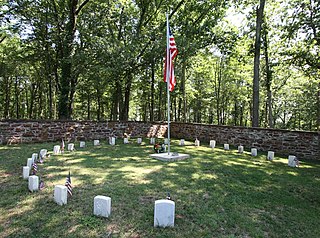
Ball's Bluff Battlefield Regional Park and National Cemetery is a battlefield area and a United States National Cemetery, located 2 miles (3.2 km) northeast of Leesburg, Virginia. The cemetery is the third smallest national cemetery in the United States. Fifty-four Union Army dead from the Battle of Ball's Bluff are interred in 25 graves in the half-acre plot; the identity of all of the interred except for one, James Allen of the 15th Massachusetts, are unknown. Monuments to fallen Confederate Sergeant Clinton Hatcher and Union brigade commander Edward Dickinson Baker are located next to the cemetery, though neither is buried there. While the stone wall-enclosed cemetery itself is managed through the Culpeper National Cemetery and owned by the Department of Veterans Affairs, the balance of the 223-acre (0.90 km2) park is managed through the Northern Virginia Regional Park Authority.

Magnolia Cemetery is a historic city cemetery located in Mobile, Alabama. Filled with many elaborate Victorian-era monuments, it spans more than 100 acres (40 ha). It served as Mobile's primary, and almost exclusive, burial place during the 19th century. It is the final resting place for many of Mobile's 19th- and early 20th-century citizens. The cemetery is roughly bounded by Frye Street to the north, Gayle Street to the east, and Ann Street to the west. Virginia Street originally formed the southern border before the cemetery was expanded and now cuts east–west through the center of the cemetery. Magnolia contains more than 80,000 burials and remains an active, though very limited, burial site today.

Paris Cemetery is located along South Main Street in Paris, Kentucky, United States. Incorporated on January 30, 1847, the cemetery is owned and operated by the Paris Cemetery Company. When it first opened, many families re-interred their dead in the new cemetery.
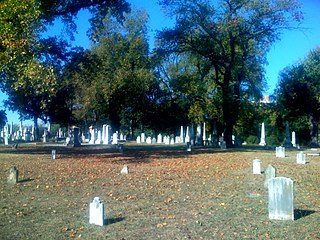
The Shockoe Hill Cemetery is a historic cemetery located on Shockoe Hill in Richmond, Virginia.

Built by Confederate Lieutenant Collier and Virginia militia with the aid of Federal prisoners, the Fort Collier redoubt guarded the north entrance of Winchester, Virginia on the east side of the Martinsburg Pike. During later Federal occupations, it was known as Battery No. 10. The fort was set on low ground, and generally offered little military advantage, except as a guard post for the pike. Lieutenant General Jubal Early used it as part of his defensive works in the Third Battle of Winchester.
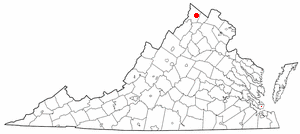
This is a list of the National Register of Historic Places listings in Winchester, Virginia.

Mary Greenhow Lee was an American diarist from Virginia. During the Civil War, Lee was a Confederate activist who kept a journal of events occurring in Winchester. According to the Virginia Department of Historic Resources (VDHR), Lee's writings "survives as one of the most informative records of daily life in Civil War Virginia."

A Ladies' Memorial Association (LMA) is a type of organization for women that sprang up all over the American South in the years after the American Civil War. Typically, these were organizations by and for women, whose goal was to raise monuments in Confederate soldiers honor. Their immediate goal, of providing decent burial for soldiers, was joined with the desire to commemorate the sacrifices of Southerners and to propagate the Lost Cause of the Confederacy. Between 1865 and 1900, these associations were a formidable force in Southern culture, establishing cemeteries and raising large monuments often in very conspicuous places, and helped unite white Southerners in an ideology at once therapeutic and political.

Mount Jackson Historic District is a national historic district located at Mount Jackson, Shenandoah County, Virginia.
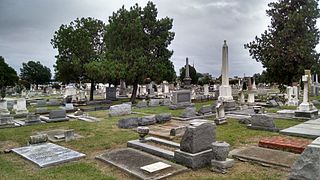
Cedar Grove Cemetery is a historic public cemetery located at Portsmouth, Virginia. It was established by an act of the Virginia General Assembly in 1832. The cemetery contains more than 400 graves with monuments dating from the late 1700s to the present. Its memorial markers include small tablets, ledger stones, obelisks, columnar monuments and mausoleums. They include notable examples of Greek Revival, Late Victorian, and Exotic Revival funerary art.

Stonewall Confederate Cemetery is a subsection of Mount Hebron Cemetery in Winchester, Virginia, established in 1866 for 2,575 Confederate soldiers who died in battle or in the hospitals in and around the Winchester area. A monument over the mass grave of more than 800 unknown Confederate soldiers is at the center of the cemetery, and there is a section for each state member of the Confederacy. The plots are thus organized according to the home states of the fallen soldiers within. There are state monuments in most of the sections.























